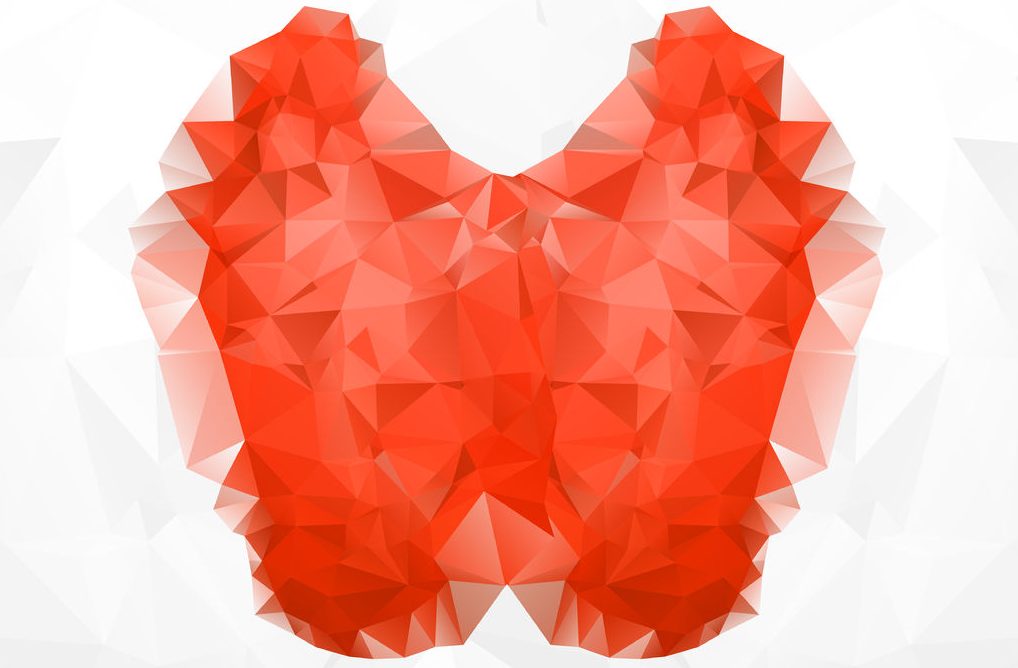
Table of Contents
Last Updated on
What you always wanted to know, but were afraid to ask or too busy to search.
A lot of people have been asking and inquiring about the thyroid and some related terms that are often too short to merit its own article (as you know if you visit this site often, I often like to write very long research essays!)
Over the years, I’ve compiled a list of common thyroid questions (approximately 65 right now!) and their answers.
Be sure to comment at the end if you have a question I haven’t answered yet or want to contribute more to an answer!
General Questions
- What is a Thyroid?
The thyroid (THY-royd) is an organ that produces thyroid hormones (Scroll down for what thyroid hormones are.) Research has shown that the thyroid plays a key role in the intricate metabolism and weight loss system in our bodies.
- Where is your/my thyroid located?
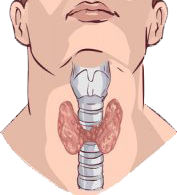 The thyroid gland is located in the front of our necks. Just below the Adam’s apple and above the base of the neck/collarbone area. Here’s a picture that helps to see what I’m talking about!
The thyroid gland is located in the front of our necks. Just below the Adam’s apple and above the base of the neck/collarbone area. Here’s a picture that helps to see what I’m talking about!
- What does the thyroid look like?
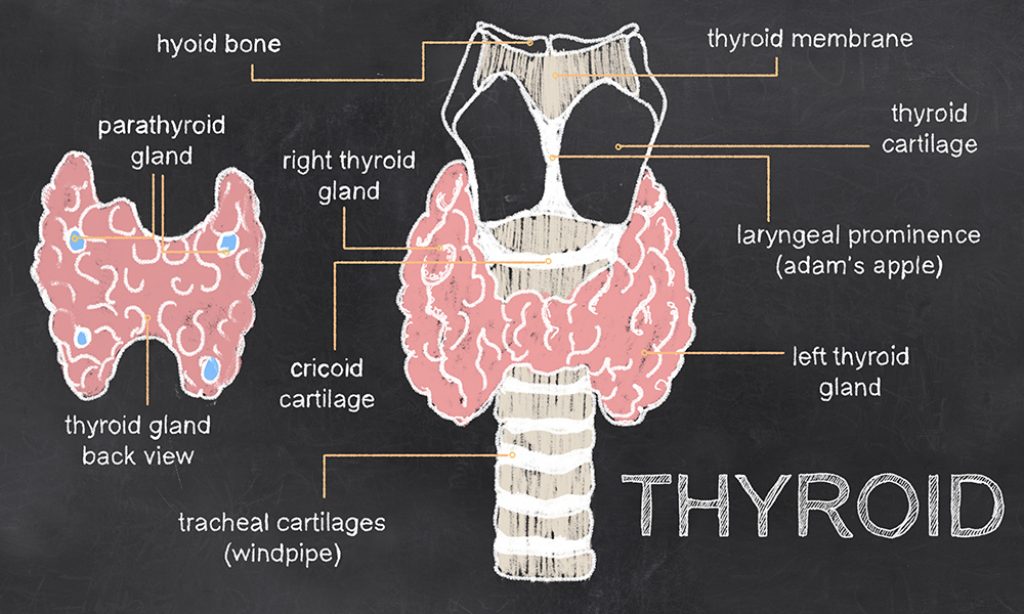 It looks like a butterfly-shaped, red gland. See the picture above!
It looks like a butterfly-shaped, red gland. See the picture above!
- What does the thyroid do (i.e. what is the thyroid’s function)?
The primarily function of the thyroid is to produce, store, and release thyroid hormones.
- What is the thyroid gland made up of?
The thyroid gland is made up of two types of thyroid cells known as follicular and parafollicular cells.
- What system is the thyroid gland in?
The thyroid gland is in the endocrine system. This system includes other glands (pineal, pituitary, pancreas, ovaries, testes, etc.) that produce and release hormones in our bodies.
- Why does my thyroid hurt?
Infections (although rare), thyroid nodules, or swelling due to hypo or hyperthyroidism can cause a thyroid to hurt. It could also be something else in the surrounding neck area.
- Why do I have thyroid problems?
The million-dollar question! No one knows for certain. It is likely a combination of factors including diet, genetics, diseases, and things we don’t even know about yet.
- How can you tell if you have thyroid problems?
If you notice you have symptoms of thyroid problems
- What are some symptoms of having thyroid problems?
Fatigue, weight gain (or inability to lose weight), mood swings, hormone imbalances, joint pain, brain fog, and feeling cold when others are not, are some of the most common symptoms of a thyroid problem. The severity of these symptoms depends on the severity of your thyroid problem.
- How can I lose weight with a thyroid problem?
It is always possible to push yourself harder, eat less and healthier, and work out harder and more often. However, it is a better idea to fix your thyroid problem at the same time so you can reach your goals even quicker.
- How does the thyroid affect fertility?
There is certainly a relationship with the thyroid and fertility. This warrants its own essay that I will write when I get the chance. The short answer is that low levels of thyroid hormones can interfere in the process of getting pregnant, lead to developmental issues, and perhaps even miscarriage.
- How does gluten affect the thyroid?
Those with Hashimoto’s thyroiditis often have gluten sensitivities as well.
If you have a sensitivity to gluten and eat foods containing gluten, your immune system will make antibodies to attack the gluten. This can worsen thyroid problems. See more about this relationship here.
Thyroid Hormone Questions
- What are normal thyroid levels?
‘Normal’ is quite a broad term when describing thyroid levels. Most doctors and ‘experts’ seem to have their own reference ranges, but depend on age, gender, pregnancy, and other factors. The most common ranges are below. See more here about normal thyroid levels.
| Serum thyroxine (T4) | 5-12 nanograms per deciliter |
| Free thyroxine fraction (FT4F) | 0.03% |
| Free Thyroxine (FT4) | 0.7-1.9 ng/dl |
| Free Thyroxine index (FT4I) | 4-12 nanograms per deciliter |
| Serum Triiodothyronine (T3) | 80-180 nanograms per deciliter |
| Radioactive iodine uptake (RAIU) | 10-30% |
| Serum thyrotropin (TSH) | 0.7-5 uU/ml |
| Serum thyroglobulin l (Tg) | 0-30 ng/m |
- What is a thyroid test?
A thyroid test is often a blood test that checks the levels of certain hormones – often TSH, T3, T4, TBG. There are also thyroid ‘self-tests’ that include measuring the temperature of the thyroid throughout the day. However, this ‘test’ is much less reliable.
- What thyroid tests should I get?
Most doctors recommend getting TSH, T3, T4, TPO, FT3, FT4, and perhaps RT3 (keep scrolling if these acronyms look alien to you.)
- What hormones does the thyroid produce?
The thyroid produces T0, T1, T2, T3, and T4 thyroid hormones. T0-T2 are precursors and not that useful. T3 and T4 are the main hormones created by the thyroid.
TSH, Thyroid Stimulating Hormone (this tells the thyroid to make more hormones), is actually created in the pituitary gland.
- What is Thyroxine (T4)?
Thyroxine (T4) is one of the major thyroid hormones (T3 is the other one.)
It is the most abundant thyroid hormone produced and requires 4 molecules of Iodide. Once T4 reaches other organs, it gets converted to T3, the active thyroid hormone.
- What is Triiodothyronine (T3)?
T3 is the second major thyroid hormone (T4 is the other one.) T3 represents 20% of the thyroid hormones and requires 3 molecules of Iodide. It is about 4 times more potent than T4.
Biologically, T3 is primarily response in increasing your body’s metabolism, and thus by extension energy levels and daily caloric expense.
- What is Thyroid Stimulating Hormone (TSH)?
TSH, much like its name Thyroid Stimulating Hormone, tells your thyroid how much T4 and T3 hormones to produce. Elevated levels of TSH mean that your thyroid is trying to produce more hormones. Low levels mean your thyroid does not need to produce any more hormones for the time being.
- What is reverse T3?
When the liver converts T4 to T3, reverse T3 is also created. Reverse T3 is the inactive form of T3. It does not lead to any metabolic changes. Those with hypothyroidism often try to lower rT3 levels in their bodies. See our article here on reverse T3 for more information.
- Where is the thyroid stimulating hormone (TSH) secreted?
TSH is secreted in the anterior pituitary gland.
- What is thyroid peroxidase?
Thyroid peroxidase is an enzyme that helps in conversion of T4 to T3.
- What is a thyroid peroxidase test?
A thyroid peroxidase antibody (TPO) test is one of the main methods of diagnosing Graves or Hashimoto’s disease. It measures the number of antibodies formed against thyroid peroxidase.
- How can I read thyroid blood test results?
Your doctor will likely help you understand your thyroid test results. The results sheets often contain reference values on there as well to help you understand your levels. Alternatively, you can look up your results on sites like this one.
- What does it mean if TSH is high, T4 low, T3 low?
This likely means you have an underactive thyroid (hypothyroidism). Your body is telling your thyroid to produce more hormones while both T4 and T3 are low.
- What does it mean if TSH is low, T4 is normal, T3 is normal
This likely means you have very mild hyperthyroidism. I would not be worried too much yet, unless you experience symptoms of hyperthyroidism, but it is something to check up on.
- What does it mean if TSH is low, T4 is high, T3 is high
This is often an indicator of hyperthyroidism.
- What does it mean if TSH is normal, T4 is high, T3 is high
Depends on how you respond to hormones and your conditions. It could indicate hypo or hyperthyroidism, or neither. Could also be thyroid hormone resistance syndrome.
- What does it mean if TSH is normal, T4 is normal, T3 is normal.
Congratulations! This generally means you have achieved the best possible results. These levels are sought after by millions. Be sure to share your accomplishments with others and help them with their goals! =]
Thyroid Disease Questions
- What is hypothyroidism?
Hypothyroidism, also known as an underactive thyroid, occurs when your thyroid does not produce enough thyroid hormones (T3 and/or T4) in the body.
- What is an underactive thyroid?
This is another term for hypothyroidism. Your thyroid is not producing enough thyroid hormones.
- What are symptoms of hypothyroidism?
Fatigue, sensitivity to cold, weight gain, muscle weakness, and hair thinning are some of the most common symptoms of hypothyroidism. The severity of these symptoms depends on the severity of your hypothyroidism.
- What is hyperthyroidism?
Hyperthyroidism is an over active thyroid. Your thyroid is producing too many thyroid hormones. It is the opposite of hypothyroidism.
- What is an overactive thyroid?
An overactive thyroid is the same as hyperthyroidism.
- What are symptoms of hyperthyroidism?
Anxiety, nervousness, rapid weight loss, and tremors are some of the symptoms of hyperthyroidism.
- What is the difference between hyperthyroidism and hypothyroidism?
With hypothyroidism, your thyroid gland is not producing enough thyroid hormones, while in hyperthyroidism, your thyroid gland is producing too many thyroid hormones. These diseases will have differing symptoms.
- What is a thyroid nodule?
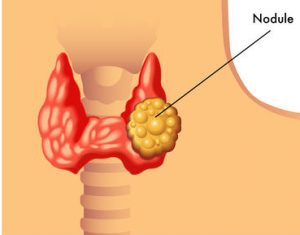 A thyroid nodule is an abnormal growth in the thyroid gland that causes a lump to form. See the picture to the right.
A thyroid nodule is an abnormal growth in the thyroid gland that causes a lump to form. See the picture to the right.
- What does an enlarged thyroid mean?
An enlarged thyroid refers to the thyroid gland being abnormally large. It is also referred to as a goiter and can cause swelling in the neck. See below for what that is.
- What is a goiter?
A goiter is also referred to as an enlarged thyroid. See description above or picture below.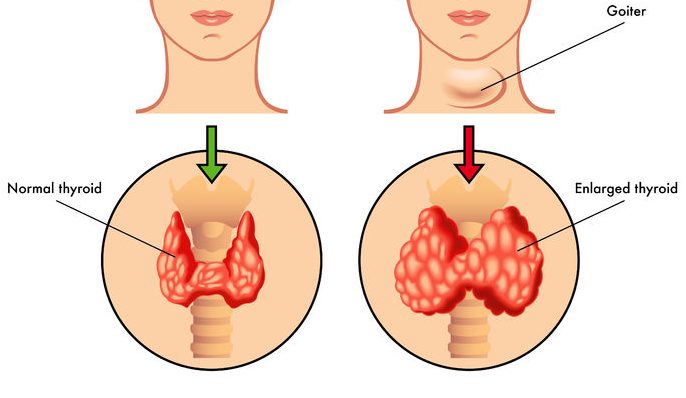
- What is thyroid cancer?
Thyroid cancer occurs when the thyroid cells grow abnormally causing lumps or swelling. Cancer in the thyroid gland is relatively are compared to other cancers (see new research on thyroid cancer diagnosis)
- What causes thyroid cancer?
No one knows yet for sure, but genetics and family history play a major role.
- What is thyroiditis?
Thyroiditis refers to inflammation within the thyroid gland. This can occur due to diseases such as Hashimoto’s disease or interactions with certain drugs.
- What is a thyroid storm?
Thyroid storm is a very rare, but potentially fatal, form of hyperthyroidism where the thyroid releases a bunch of thyroid hormones very quickly.
- What is Hashimoto’s Thyroiditis or Hashimoto’s disease?
Hashimotos Thyroiditis/disease (refers to the same thing), is an autoimmune condition where the immune system ends up attacking the thyroid gland. It is often a cause of hypothyroidism. See our article here for more information.
- What is a thyroidectomy?
Thyroidectomy refers to an operation that results in removal of part of or the entirety of the thyroid gland. Those with a thyroidectomy will have to take thyroid hormone replacement drugs for the rest of their life.
- Is it just me? Who else has thyroid problems?
Definitely not! The American Thyroid Association estimates that 20 million Americans have some form of thyroid condition. Here’s another statistic to put it into perspective: Synthroid, a T4 drug used in the treatment of hypothyroidism, is the most commonly prescribed drug in the United States.
Thyroid Treatment Questions
- What are thyroid treatments?
Thyroid treatments are either prescription drugs or thyroid supplements that aim to fix your thyroid disorders. See our article on ‘thyroid disorders and treatment options’ for more information.
- What are T4 treatments?
T4 treatments help replicate thyroid functionality through external intake of the T4 hormone (commonly through drugs like levothyroxine or Synthroid). Basically, you take T4 hormones in the form of a pill. The idea is that if your thyroid has more T4 hormones, it will be able to produce more T3 hormones and you will feel better.
They are often the standard in treatment of an under active thyroid (hypothyroidism). Synthroid and other forms of Levothyroxine are T4 treatments.
- What is Synthroid?
Synthroid is a pure T4 hormone replacement treatment for an under active thyroid. Every pill of Synthroid contains a specific amount of T4 hormones (depending on your dosage you might get a lot of just a little.) Over time, the T4 levels in your body increases, leading to higher T3 levels as well.
- What is Levothyroxine
Levothyroxine is the generic version of Synthroid. In other words, Synthroid is the brand name.
- Where does Synthroid come from?
Synthroid contains synthetic, but identical, T4 hormones produced in a laboratory.
- What is Armour Thyroid?
Armour Thyroid is a natural T3 and T4 hormone replacement treatment for an under active thyroid. Every pill of Armour Thyroid contains a specific amount of T3 and T4 hormones (depending on your dosage). The idea is that by introducing external hormones into your body through Armour Thyroid, your hormone levels will eventually increase and you will feel better.
- Where does Armour Thyroid come from?
Armour Thyroid is made from the desiccated thyroid glands of pigs.
- Where can I buy Levothyroxine or Armour Thyroid?
If you want to buy Synthroid, or other forms of Levothyroxine, or Armour Thyroid, you need a prescription from your doctor.
- What is the difference between Synthroid and Armour Thyroid (Levothyroxine vs Natural Desiccated Thyroid)
The short answer is that Synthroid contains only T4 hormones, while Armour Thyroid contains both T3 and T4 hormones. The long answer can be found here in our article on Synthroid vs Armour Thyroid.
- What are T3 treatments?
T3 treatments aim to treat your under active thyroid by introducing T3 hormones in your body, often through pills.
This works in a similar way to how T4 treatments work (but obviously instead of T4 you get T3.) Cytomel is one of the popular T3 treatments.
- What is liothyronine?
Liothyronine is the generic name for T3 thyroid replacement treatment hormones.
- What is Cytomel?
Cytomel is a brand name T3 hormone replacement treatment used in the treatment of an under active thyroid.
If you take Cytomel, you introduce external T3 in the body. Over time this raises T3 hormones in your body.
- How should I take thyroid medications?
Thyroid medications usually come in the form of pills or capsules. You should take them on an empty stomach about an hour before breakfast or coffee.
- When should I take thyroid medications?
Most people take their thyroid medications in the morning when they wake up.
- What should I avoid while taking thyroid medications?
Certain foods and drinks can hamper the absorption of thyroid medications, including coffee. Your doctor should share a list of what drugs to avoid when on thyroid medications.
- What are thyroid supplements?
Our bodies often lack the nutrients needed to ensure the thyroid is working at its highest potential throughout the day. Thyroid supplements help correct this by providing nutrients, vitamins, minerals, and herbs that support thyroid functionality throughout the entire day.
- Where can I buy thyroid treatments?
Most thyroid treatments such as Levothyroxine, Liothyronine, or Armour Thyroid, need prescriptions. Since Thyroid supplements are classified as dietary supplements, they do not need prescriptions.
- How long does it take before treatments start working?
Prescription drugs often require 4-6 weeks to fully work. They need time to build up thyroid hormone levels within the body.
Thyroid supplements often work quicker, often in 2 weeks or less of consistent use.
- How can I improve thyroid function naturally?
There are a lot of options to improve thyroid function naturally: diet, NDT (natural desiccated thyroid), supplements, lifestyle changes, etc. See our article here on the ‘complete guide to boosting thyroid hormones and function naturally’ for more information.
- How can you shrink thyroid nodules naturally?
If the thyroid nodule(s) is/are caused due to deficiency of vitamins or minerals (lacking iodine, selenium, or Vitamin D can cause nodules) then supplementing existing diet with these nutrients may be able to help. I will say this though, thyroid nodules can turn into serious conditions, so it might be best to see your doctor about this.
- What is bad for the thyroid?
OK… this is hard to answer in a couple sentences! Off the bat: gluten (if you’re sensitive), soy, fatty and sugary foods, and cruciferous vegetables. I’ll probably write an article about this. Check back later!
Comment below if you have a question!

cruciferous veg are not bad for thyroid, please correct your article
Koosha, you get a better doctor who will help you to do the following: try natural dessicated thyroid, eg. Armour or Naturethroid instead, at a dose comparable to the synthetic you are taking, then adjust every 6 weeks according to symptoms, not blood tests. but take the blood tests to figure out what your blood tests/levels look like when you are feeling good–i.e. your personal “normal” ranges
Hi Violet,
High consumption of cruciferous vegetables can interfere with thyroid production. See this article here for more information: https://lpi.oregonstate.edu/mic/food-beverages/cruciferous-vegetables Specifically, the paragraph that states “Iodine and thyroid function.”
My all lab test after 7 years levothyroxin pill taking
Is normal but i have all hypothroidisen symptoms cold night cold sweating constipation confused and…like im not treating what do u think???
Hi im koosha i have been taking levothyroxin about 7 years my tsh ,t4,t3 are in range but i have all hyoothytidisem symptoms im alwayes cold tired and fogy mind my dr sayes i should be good but im not realy
I was wondering if you knew of any cases where a severe ear infection
in an adult caused thyroiditis that eventually led to permanent
hypothyroidism. I was diagnosed with hypothyroidism within a year of
the ear infection, around twelve years ago, and since that time, I’ve
been on the same dose of levothyroxine, 50 mcg. I had thyroid antibody
testing done once, and it was negative. I’ve never noticed any
telltale signs of Hashimoto’s thyroiditis, with symptoms of both
hyperthyroidism and hypothyroidism and variable TSH. In fact, I never
noticed any symptoms with the ear infection that didn’t seem related to
it. It lasted for several days and was very painful. About ten years
before the ear infection, I was babysitting a child who had a cap gun.
He put it right up to my left ear and pulled the trigger. I wonder if
the damage from that incident might have made me more vulnerable to the
ear infection and made it more severe than it might have been
otherwise. I’ve never been diagnosed with any specific thyroid
condition. Underactive thyroid was discovered via a blood test, and
I’ve been on levothyroxine since. I see an ENT doctor in July and an
endocrinologist in November, and I plan to address this question with
them as well. Thanks so much for any help or information you can
provide.
can homeopathy really works for hypothyroidism.. they are saying it really works and completely it with in one or two years…..
Hi Rajesh,
I have not heard of homeopathy being an effective treatment for hypothyroidism. I’m sure a very small number of people had a good experience with it, but I would not recommend it.
Hi, been diagnosed with under active thyroid in August. Got prescribed Levothyroxine. After couple of weeks got dull heavy painful headache which never went away. Persisted with the pill for 2 months. No improvement. Had to stop taking it. Now looking at natural ways of restoring thyroid to a good level. Is that possible? I eat a lot of broccoli, cabbage, cauliflower, spinach etc. Am vegan all my life. I’m a 66 year old male. Should I stop eating broccoli? All very confusing.